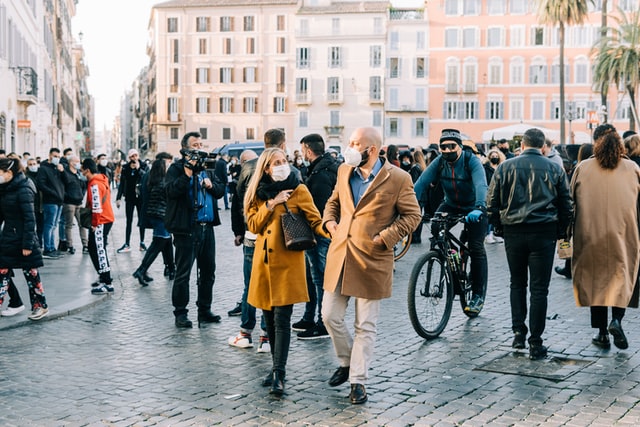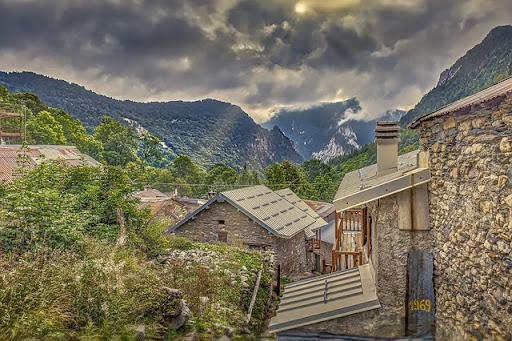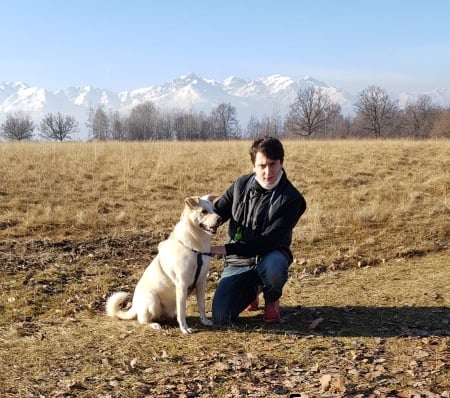
Written by Alessio & Vosot Ikeida
Covid-19 and Hikikomori Life
Vosot : Hi Alessio, welcome to the article of Hikipos.
Alessio: Hi Vosot, thank you for having me for this conversation, it's a pleasure to be "here".
Vosot : How have you been doing in Italy these days since you met the “new-normal” life caused by Covid-19?
Alessio I'm doing well, now I'm enjoying my new life that began at the beginning of 2021 in my new home, my grandparents' house.
I've been a caregiver for 9 months, and I really enjoy this "new normal".
The first wave of Covid-19 didn't change much in my routine in Northern Italy. In fact I was living exactly like a hikikomori, since the start of the pandemic.
Vosot : I heard on the news last year that Northern Italy had been severely affected by the peril of Covid-19, though?
Alessio : I think you are talking about the Lombardy region, especially Bergamo. I live in Piedmont, which is a mountainous region, about 100 km away from there. And we get a severe situation from time to time here too. We easily get into so-called "red zone" where nobody can go out for almost any reason. But as you can imagine, I lived already in reclusion and I didn't feel any change in my life.

Vosot : I see. Then when did you meet the second wave of Covid-19?
Alessio : It came over here around summer last year, and I was not prepared for that, actually. I was planning to meet up with other hikikomori friends from my region, but I couldn't carry it out because of the pandemic and I isolated myself even more. But as I said before, I now enjoy life and I'm grateful for the opportunity to be alive in this world and the chance gave me to leave it as a better place for others.
Vosot : You don’t feel so negative to be isolated as other “normal people” do, do you?
Alessio : It might sound differently from my previous words, but I lived the hell in my head for at least 6 years of my isolation. I suffered from the "triggers", a debilitating mental problem. For those who don’t know what a “trigger” means in the context of trauma, here is the link to refer to.
Vosot : Thank you. Yes, I know what it is.
Alessio How are you dealing with the pandemic in Japan?
Vosot : Yes, as you know, I live in Tokyo, where the number of infected people has risen the most in Japan. But just like you, the arrival of the Covid-19 disaster did not bring any change to my life of hikikomori in the beginning. However, - I am sure it is the same in Italy though, - there are many different types of hikikomoris, and some of them go out all the time, so it seems that those people were stressed out by being ordered to stay home by the government.
After the first wave went away, we kept holding the gatherings for hikikomori, with wearing masks and making our hands wet with disinfectant, for the rest of 2020.
But when the emergency was declared in April 2021 for our third time, and finally I started to feel tired of Corona period. In addition, that summer, the Tokyo Olympics and Paralympics were held under a state of emergency here. I found it abnormal. Around that time, the variants like delta strain came into enter Japan, and the number of infected people shot over.
As of the end of October 2021, the number of infected people in Japan has calmed down as vaccination rates have increased. But there may be another sixth wave coming in the future.
Relationships with the Parents

Vosot : Would you tell me how you became a hikikomori?
Alessio Well, obviously it isn't easy to answer that question briefly.
Vosot : I understand. It won’t be easy. Then please try to tell me about your parents first.
Alessio : OK. I had a present but oppressive father, and a distant and apathetic mother. The specialists on hikikomoris often say that the father is usually absent, and the mother is likely oppressive in the family where the child becomes a hikikomori. However, in my case, it was exactly the opposite.
Vosot : Well, it’s interesting. Hikikomori cases are so various.
Alessio : Yes, we are. I always felt different from others. I could not have the things others had, games I would say, at the same time I had many gifts from my parents in my childhood.
Vosot : Were you glad to have those gifts?
Alessio : It wouldn’t be true if I said “No, I was not glad at all whenever I was given gifts from my parents”. I was glad in a sense.
But I could not erase the feeling that they were not really something I wanted to get from my parents. I could not say so. And also even as a child, I was thinking I should not hurt my parents so I had to pretend to be glad.
Vosot I imagine you were a kind child, too.
Alessio : Sure, I was, but it was never enough for my father and mother who always pretended from me to be very humble, and I'm actually so, in my deep-self I embraced these notions given me from my parents.
At the end, I could reach the point to say, “I am what I am, because my parents have made me so, whether in a good or bad way”, so I am thankful to my parents too. There are both positive and negative aspects to be considered.
It was their anxiety to be parents that crushed me to the ground. I realized they were not able to express love in any other way than giving me stuff and pretending to love me and to be loved.
Vosot : Quite impressed to hear. I imagine you must have thought about the relationships with your parents deeply again and again until you have come to explain like that, which is so profound but comprehensive.
What would you think of your parents now?
Alessio : I don't blame them too much for these absences of true love… But I think it's important to understand our past to identify who we are now and who we want to be in the future.
Vosot : Agreeable.
Alessio : Anyway, I always felt different from others. I always tended to forgive other guys who committed bad stuff on me and I didn't talk to anyone about that because I didn't realize they were on the wrong side.
So, growing up, I made friends, but these were not real friends because I was not able to identify it as a toxic relationship. They were indeed toxic friendships and I could go hard on this, but they really destroyed and changed my life for the worse.
Vosot : It must have been painful. What was your adolescence like?
Alessio : Well, when I was 15, I met many people who were bullying me and I kept forgiving them all the time. They were calling me with some bad names which I can't say right now, but they were definately deprecatives.
This insane relationship I had with others pushed me in the burnout. You can find what “burnout” means here.
https://it.m.wikipedia.org/wiki/Sindrome_da_burnout
Wikipedia in English "Occupational Burnout"
Alessio : I had an emotional breakdown, so I could not go to school anymore, follow the studies, go out to do any sports, hang out with friends. Then I left school gradually, failing it, and I became a hikikomori.
Vosot : I see. How many years ago was it?
Alessio I kept staying in my bunker for 7 years so far. It was really frustrating at times because I didn't know how to escape from this hikikomori condition. I suffered and I despaired a lot, for my failures of my past life as a student and as adolescent. I slept during the day and I was awake during the night.
Vosot : It's hard when there's no way out.
Alessio Yeah, it is… Then, I met a person, a girl of my age who completely changed my life for the better. We slept together and she hugged me at some point. She felt sorry for me and my condition and I had too, because she was living like a hikikomori too. She gave me the will to live and my suicidal thoughts disappeared after I felt her warm hugs.
Vosot : How nice! Did you get along with her well?
Alessio We stayed in contact, but shortly she had to return to her city. Knowing that, I could not stay calm and I got mad because I was attributing the guilt of her suffering to me. So I decided to go to the hospital, in particular to psychiatric hospitalization.
I stayed there for 2 weeks. She had gone back to her city, and I felt so empty in my life. I didn’t know what I could live on everyday anymore. It was so tough, and I was depressed. But the medicines did their job and I felt gradually better and better. After 2 weeks I came out of the hospital, and I have been trying to rebuild my life without her.

Projects for Hikikomori

called "Baraggia" and
behind the Alps of Piedmont
Vosot: And how are you feeling now?
Alessio : Now, I'm an enthusiast. I think there are many things I can do, even with being a hikikomori.
Vosot : What kind of ideas do you have in your mind now?
Alessio I have many projects for hikikomori people. It makes my life go ahead. It gives me a purpose to live for, you know.
Vosot : Yes, I understand.
Alessio : The first project is called "Hikipoems" and it's about collecting poems, writings, songs, in general artistic stuff of people who lived the hikikomori conditions. I have already written about it here on Hikipos, so I would not repeat. If you are interested, please refer to the following.
Vosot: Yes, I have read it before.
Alessio : The second one is about a collaboration born here in Piemonte, with Alessandro and Eva. I have the role of "generators of ideas" that they collect and select to be part of their group, HikiTo
Vosot : Oh, what a colorful homepage you have got!
Alessio : Particularly interesting is their approach to the outside, we plan to make multiple encounters, meetings, in 4 or 6 reclused people, in the outside world. We have, still in the initial phase, many chats on the national territory of Italy that hopefully will become offline meetings soon, when the lockdowns will end.
Vosot : What else?
Alessio : I will take part in a documentary about solitude, and I will talk about my past of hikikomori.
We are planning to make a permaculture course for hikikomori people in my home as I have a garden.
And finally my dream is to create an offline community possibly eco sustainable for hikikomori people.
In general I have much compassion and empathy for the people living in hikikomori conditions like I did. So that's my motivation going forward, and I will probably offer myself as a volunteer to listen to other hikikomoris that live or lived my same condition in my city.
Vosot : Great plans. There are some people who tried similar projects in Japan too. I just wish good luck on yours.
Alessio : I wish you would tell me more about these projects in Japan about hikikomoris.
Vosot : I hear several hikikomori people are living together in a big house on the deep-side of a mountain in Wakayama, Japan, though I have never visited. Usually house rent is very expensive in our country, but the big house is located in such a countryside that they don’t have to mind the rent money.
Alessio : I understand… Thanks for this conversation Vosot! Looking forward to talking to you again! Maybe we could do an interview with Eva and you on the HikiTo site!
(End)
...To the Italian version of this article
...To the Japanese version of this article
